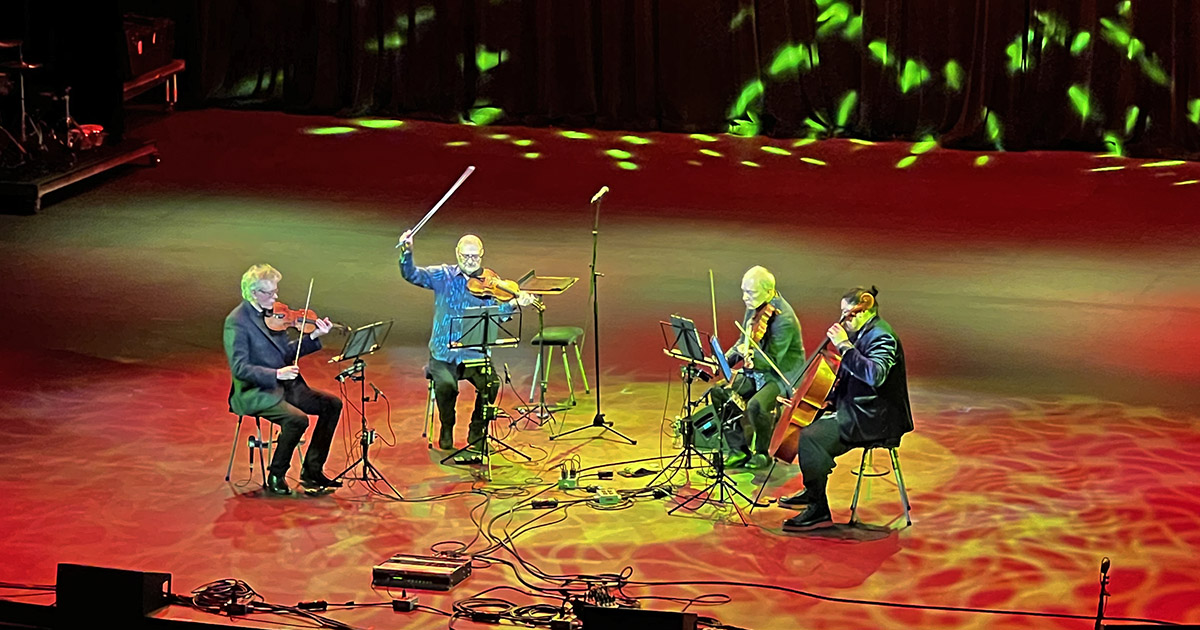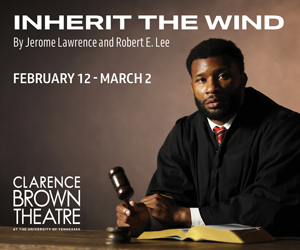When I purchased the CD pictured below in 1986, it would have seemed a weird improbability that 38 years later I would be witnessing the Kronos Quartet perform a cut from that recording at a major music festival like Big Ears. Nor could I have guessed that

the quartet would not only still be going strong in its 50th anniversary season, but entering a new phase with new members. Earlier this month, the Kronos Quartet, formed by violinist David Harrington in 1973, announced that violinist John Sherba and violist Hank Dutt would be retiring from the ensemble in June. Dutt joined up with founder Harrington in 1977, with Sherba coming on the following year. A newcomer, cellist Paul Wiancko joined the ensemble in 2023. Kronos’ Big Ears 2024 appearance will have the sad distinction of being one of the last performances by this incarnation of the quartet.
A Change is Gonna Come
Replacing Sherba and Dutt are two new members: violinist Gabriela Díaz and violist Ayane Kozasa.

A native of Georgia, Diaz has gravitated toward contemporary music and has collaborated with a number of composers—Pierre Boulez, Jessie Montgomery, Alvin Lucier, Unsuk Chin, John Zorn, Joan Tower, Roger Reynolds, Chaya Czernowin, Steve Reich, Tania León, Brian Ferneyhough, and Helmut Lachenmann. She is a member of the violin faculty at Wellesley College and also teaches at the Longy School of Music at Bard College.
Recently, Kozasa has teamed with new Kronos cellist Paul Wiancko in a duo, Ayane & Paul. She was a founding member of the Aizuri Quartet where she learned the nuts and bolts of launching a brand new ensemble. The quartet served as the 2018 quartet-in-residence at the Metropolitan Museum and won the grand prize winners of both the Osaka International String Quartet Competition and MPrize Chamber Arts Competition. She was the principal violist of the Chamber Orchestra of Philadelphia from 2012 to 2016.
Kronos at Big Ears 2024
The quartet’s appearance at Big Ears was called simply “Kronos Quartet | Five Decades.” But rather than being a history lesson or a dull Greatest Hits compilation, the two one-hour sets were more of a sampler of their continuing modus operandi of pushing stylistic limits. In many ways, their five decades of work have redefined our concept of the string quartet and opened up alternative paths in music. Longevity and success, though, have a way of vaulting performers into the so-called mainstream, that place where the once-inspired usually go to die. That hasn’t been the case for Kronos—simply stated, being on the cutting edge requires constant honing, something Kronos has done with a magnificent career arc.
Their Big Ears set contained past works by Philip Glass, Aleksandra Vrebalov, and Steve Reich, and the intriguing—if not infamous—performance of Jimi Hendrix’s “Purple Haze,” arranged by Steve Riffkin, from that first album on the Nonesuch label.

The set also had a couple of very notable guests: Brian Carpenter of Ghost Train Orchestra and improvisational singer Tanya Tagaq, who first set Big Ears on fire in 2015. Perhaps the most compelling shift of direction of the afternoon sets was a song by the legendary Moondog, “Choo Choo Lullaby” featuring Carpenter on vocals and harmonica. Carpenter is the founder of Ghost Train Orchestra, and the song was off their recent collaboration album with Kronos, Songs and Symphoniques: The Music of Moondog.
Another of the guilty pleasures of Big Ears is the opportunity to eavesdrop on remarks and conversations as listeners leave a venue. Interestingly, there seemed to be a spring in everyone’s step and a satisfied smile on their faces as they re-played the vibrant Kronos performance in their heads. After all, anything that can still feel good —and new— after 50 years, is worth cherishing.






